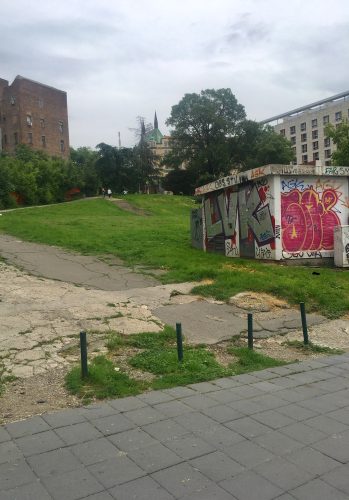I hit the “sign up” button two weeks ago, fulfilling my duty to write a blog post and thinking I had given myself enough time to come up with something to write about. Over the past two weeks, something funny would happen and I would think to myself, “maybe I will write about this.” Nothing much stuck though – I don’t remember those small things, nor how I might fill a page while writing about them.
Several days ago, however; I exchanged text messages with our very own Professor Claudia Koonz. A couple of these messages contained suggestions for my blog post. Even with the suggestions, I couldn’t figure out the perspective from which I would write, nor which angle I would take. The final push that launched me into my current endeavor was scrolling through my peers’ blog posts for inspiration. There, I came across John Markis’ postabout a Roma boy named Aleksandar.
This story was not new to me – John previously told it in one of our group reflection sessions. But, my second encounter with John’s story took a different color than the first. This time, it was colored by an experience of my own – I visited Roma settlements with my organization only last week.
In John’s piece, he questions our role as Duke Engage students in addressing the plight of marginalized people – how and whether we can specifically and actively help. He writes about his frustration in ultimately being unable to do so.
Now, transitioning, to how John’s story relates to me. As previously mentioned, I visited several Roma settlements with my organization last week. My organization – The A 11 Initiative – goes on field visits to actively seek out vulnerable populations and offer legal and advocacy services. I tagged along on one of these very visits. Even my coworkers, who are seasoned at literally walking into communities and knocking on doors, say that the process can be awkward. But, after being in the larger communities for only a couple of minutes, people began to slowly come out of their homes, just lining up to just be heard.
This is what surprised me the most – people did not resent our presence but were instead open and welcoming, and often completely vulnerable. My coworker theorizes that this openness comes from the fact that no one ever seeks out these settlements nor their inhabitants. They are forgotten by the State and by aid workers for the most part – completely marginalized by society. So, when someone finally did come – a lawyer, an advocacy associate, and me – they graciously shared their struggles. And we listened.
As a non-Serbian speaker and an undergraduate student, there was not much for me to do, except to listen. And listen I did. Not exactly in the conventional sense – I did not understand the words they were saying. But, their emotions, expressions, and humanity spoke for themselves. All that I could offer were nods and smiles and handshakes and eye contact, all in an attempt to show that I recognized their humanity.
That phrase – the recognition of humanity – is something that Maddie Alvarado said when we were all discussing John’s experience with the little Aleksandar. She said something along the lines of “I think the best and most important thing we can do is to acknowledge humanity. To show, at least with eye contact or a smile, that we care.”
John lamented the fact that he could not do more for the Roma boy, that he could not give him tangible, impactful aid. But, I think John fails to see that he did indeed do something: he looked Aleksandar in the eyes and had a conversation with him – albeit over Google Translate. John recognized Aleksandar’s humanity. He did this even when the storekeeper and the security guard did not. Now, this isn’t enough to solve generations of inequality and prejudice. But, it is something, and it is a start.
Thankfully, with their years of training, people like my coworkers are equipped to dismantle, piece by piece, the prejudice and inequality that has stood for generations. They can advocate for and alongside these marginalized communities. They can offer legal aid, can lobby governments and can change policy. We, as Duke Engage students, can work alongside these organizations and can carry forward their efforts. And lastly, and perhaps most importantly, we can listen.

 An open space in the City Center, Belgrade
An open space in the City Center, Belgrade